The battle at the White Hill was on 8 November 1620.
An army of 15,000 Bohemians and mercenaries under Christian of Anhalt was defeated by 27,000 men of the combined armies of Ferdinand II, Holy Roman emperor led by Charles Bonaventure de Longueval, Count of Bucquoy and the German Catholic League under Johann Tsercleas, Count of Tilly at Bílá Hora near Prague.
In the space of an hour, the Catholic Habsburg army routed the Czech Protestants on this hillock, deciding the fate of Bohemia for the next 300 years.
The new king, Ferdinand II, punished the Protestant leaders and took it upon himself to bring his country back to Catholicism. In 1627 he canceled religious tolerance and ordered that children be taught in Catholic schools only. German was put on the same level as the Czech language, and traces of Czech culture could only be found in provincial areas.
Twenty-seven noble leaders of the insurrection were executed at Prague’s Old Town Square, along with an untold number of common people.
The dark era began, and over thirty thousand people, mostly the intellectual elite, left the country and never returned.
Catholics all over Europe celebrated the victory. In Rome, Pope Paul V died while leading a victory parade, and his successor, Gregory XV, gave a new basilica by Italian architect Carlo Maderno the name Santa Maria della Vittoria (Saint Mary of Victory) in honor of the battle.
In Prague, Ferdinand laid the foundations of the monastery that still stands on the battleground, and he erected a victory column in the heart of the city, which Czech patriots saw as a symbol of Habsburg tyranny and tore down after 1918.
Today the only reminder of the battle is a small memorial cairn located on a mound in the middle of a field, and the Church of Our Lady of Victories (1704-14).
People attacked it, climbed over, demolished with all their power. Finally, they could breathe; they were free.
The fall of the Berlin Wall tore off an avalanche of events that led to the fall of communism in the Eastern Bloc. The 30th anniversary of the reunification of Berlin will be commemorated in Prague’s Holešovice.
“We decided to organize a cultural event dedicated to the fall of the Berlin Wall because we feel that in the context of commemorating the 30th anniversary this event reminds all of the fall of the Iron Curtain in Prague. As we have a personal relationship with East Germany, our event takes place in Holešovice, near the Little Berlin district. We also want to conceive this day as an unofficial opening of our new Kabelovna room and commemorate this anniversary every year,” said Lukáš Rychtařík from Championship Music.
Visitors can look forward to a busy schedule on Saturday, 9th of November, from 1 pm to 10 pm, with the Minister of Culture, Daniel Herman. During the event, the artistic installation of the Iron Curtain, designed by Vítek Škop, will be unveiled.
At the same time, an exhibition of three large-format period photographs will be revealed – a reprint of a photo with balloons from November 1989 by Jana Šilpocha, as well as two enlargements of the Berlin Wall by Jana Šibíka, which are also included in his new book, 1989. It will be for sale, and the author will personally sign it.
In the atmosphere of 1989 visitors will see a retro furnished room with secondhand, listen to hits directed by Vojtěcha Tkáče and Zdeňka Lichnovského (moderators of the program Reflector on Radio 1), and a ride through the legendary Trabant. A thematic screening by HBO will run throughout the afternoon.
Ben Cristovao and the singer of the band Mirai will also take part in this event, and together they will introduce the video clip for the new song “Come to me closer,” filmed in Berlin. There is also a vegan bistro in Kabelovna, and the menu includes vegan sausages, pickled sausages, currywurst, and solyanka.
More information here
Before rap become synonymous with gangstas, and mostly misogynistic rhymers there was the hey-day time or “the daisy age” of the perhaps naïve but more peace-loving hip-hop artists, and among the best of this period is De La Soul from the late ‘80s—formed in 1987 to be exact from Long Island, NYC.
Back in those days, hip-hop had a sense of humor, it had creative verve, and it grooved relentlessly. There was sexiness to the music and risqué lyrics but without masochistic put-downs and posturing.
Public Enemy was already a force (and not a peaceful one for sure), but they had a dignity and spirit that did not rival or counter this newer wave of hip-hop collectives, which also included A Tribe Called Quest, Digable Planets, and the Beastie Boys as more positive hip-hop messengers to the mainstream.
Approaching the end of this year’s Strings of Autumn Festival 2019 is a celebration with the legendary hip-hop group De La Soul still together with the original trio, Posdnuos, Trugoy and Maseo to honor the 30th anniversary of their best-known recording “3 Feet High and Rising” and, of course, more importantly for the Czechs to celebrate 30 years since their November 1989 Velvet Revolution.
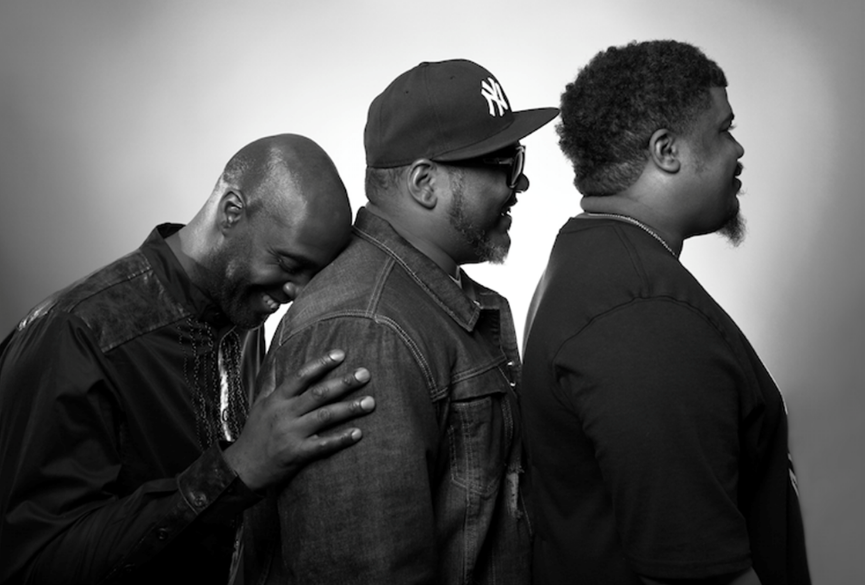
“3 Feet High and Rising” released on Tommy Boy Records is considered a high-water mark in hip-hop recordings. With interludes of short comedic skits similar to Cheech & Chong between songs, including a sly (but sadly legally-challenged) sample of The Turtles “You Showed Me” but with spoken words in French “Translating Live From Mars,” followed by simply one dope-jam groove after another. There is not a bad track on the album and it was done still when the track order on albums had a purpose for full enjoyment (and with no commercial interruptions courtesy of You Know Who or That One Too).
De La Soul did want to improve society, but they looked at it from the perspective of one guy at a time. The light-hearted rhyme to their “A Little Bit of Soap” is all about making the community more livable.
“Please listen to this simple De La style I’m gonna sing
It’s strongly directed to all the misery you’re bringing
Now I’m not all about dissing someone else personnel
But there’s no quota on your odor
That’s right, you smell!
Now you might feel a little embarrassed, don’t take it too hard
And don’t make it worse by covering it up with some Right Guard
Before you even put on your silk shirt and fat gold rope
Please take your big ass to the bathroom
And please use
(A little bit of soap….)”
Now in its 23rd edition, the Strings of Autumn Festival brings top-notch experimental, classical and jazz or cross-over musicians for a series of concerts in October-November, and this year’s De La Soul concert is a testament to their commitment of programing for a broad spectrum of music lovers.
De La Soul, with opening act Chris Dave & the Drumhedz
Tickets here
Make a note in your diary: On November 16, 2019, you will have a unique chance to deepen the bond that already exists between you and artists, attend workshops, lectures, book signings or participate in discussions with directors or touring the backstage in small and big theatres.
The event has the potential to amplify the visibility of individual theatre venues and ensembles, but also to raise the profile of Czech theatre as a whole in the minds of the public.
This edition will commemorate the 30th anniversary of the Velvet Revolution, bearing a subtitle called Theatre and Freedom. In Czechoslovakia, theatre played an important role in the political changes in the 1990s.
The reminder of political changes in Central and Eastern Europe invites the audiences to look back on ideals and hopes in the 1990s. The coordinator of the event is the Arts and Theatre Institute.
Theatre Night is organized within the European Theatre Night project, which was launched in Croatia in 2008. Last year, 109 institutions from 30 Czech and Moravian towns and cities participated in the project which was visited by 40.000 visitors.
In Prague, 52 theatres and ensembles prepared a program for visitors.
A recent survey of the European theatre audiences has confirmed that for Czechs theatre is a social event in the first place. The main motivation for going to the theatre is the desire to spend time with family and friends.
Czech Theater Night is part of the international European Theater Night project. The idea of a universal theater festival came to Children’s Theater Dubrava (Slovakia) and was eventually supported by a dozen European countries.
Theater Night in the Czech Republic is considered to be the most visited among others in Europe.
How do we make the best line up for November even better? For the end of the month, Duplex is delighted to announce two big gigs!
On Thursday 28th – Dutch DJ Jaap de Vries who is standing on the stage behind the project Zonderling and on Friday 29th – young talent from Melbourne, Australia who will play in the Czech Republic for the very first time: Throttle!
Supporting DJs will be the cream of the Czech scene. For the Thursday with Zonderling it will be the resident DJs – Deep Deer, Tokátko, Namaas, and Nick Martino. Friday event with Throttle will have support by Denis Weisz, Tom Hart, YLLOW and Matis & Mirasso.
Zonderling has created their own version of today’s electronic dance music. Freaky sounds by a headstrong duo working on musical impulses, leading to a streak of powerful releases with a character of their own. In a world where genres and rule books aren’t part of the plan, you’ll find the Dutch duo Zonderling, comprised of producer Martijn van Sonderen and DJ Jaap de Vries.
Their sound could be described as unusual but gratifyingly captivating. Whether it’s Don Diablo’s edit of ‘Tunnel Vision’, numerous remixes for the likes of Martin Garrix, Zedd and Sam Feldt amongst others, the house banger collaboration ‘Lee’ with MOGUAI on Oliver Helden’s Heldeep Records, or their recent collaboration with Belgian producer Lost Frequencies on the hit single ‘Crazy’ (over 47 million Spotify plays at time of writing), Zonderling is getting support from every angle.
Although just 22 years of age, Australian producer Throttle has become one of the hottest names in dance music. Collaborating with the likes of Galantis and Oliver Heldens, officially remixing Ed Sheeran and performing at Tomorrowland all before his 21st birthday, it’s no wonder Throttle is regularly labeled the next big thing in electronic music.
Using a unique blend of organic and electronic sounds, he puts his own unique stamp on every production. Throttle isn’t about what’s trending now, but what’s cool indefinitely.
Tickets available here
Břevnov is one of the traditional districts of Prague in which you can find the beautiful and oldest male Monastery in the Czech Republic.
Located in Prague 6, precisely in Markétská 1/28, the closest public transport stop is the Břevnovský klášter tram stop. Situated between the White Mountain (Bílá Hora) and Prague Castle, the Břevnov Monastery is still active, and Benedictine monks are living in it. Founded by Prince Boleslav II and the second Archbishop of Prague St Adalbert, the present appearance of the Benedictine complex represents a masterpiece of the Baroque.
The Monastery runs a hotel and a traditional Czech restaurant with an open fireplace. The restaurant Klášterní šenk, located in the grounds of the Monastery, has a beautiful beer garden opened in the summer that offers most of the beers produced there. Therefore, Břevnov Monastery is also associated with a brewery whose production can still be tasted today, Břevnovský Benedict beer.
The entrance to the complex, including the garden, is free. The extensive garden adjoining the Monastery is where the abbot’s summer house named Vojtěška is located. The guided tour of Břevnov Monastery includes the visit to the Baroque church of St Margaret and the Romanesque crypt, Prelate’s residence (the representative house of the abbot) and the convent with the enclosure.
The admission fee in the Czech language is 100 CZK for adults, 60 CZK for seniors (65+) and students, 50 CZK for children (7–14 years) and free for children up to 6. You can also visit the Monastery in English both on weekends and on weekdays only after prior arrangement. Admission fee for guided tours in English are 150 CZK for adults, 90 CZK for seniors (65+) and students, 75 CZK for children (7–14 years) and free for children up to 6.
If you need more information about the admission and opening hours of the Břevnov Monastery you can visit the official website.
The Břevnov Monastery (Břevnovský Klášter) is in the heart of the neighborhood, and when visiting, you can go to plenty of other interesting sights nearby. The grounds of the Monastery are well worth exploring with charming gardens, and a restored Orangery converted into a contemporary art gallery.
This Monastery is a place that impresses the visitor with its historical atmosphere and open spaces, making it a perfect spot for escaping the hustle and bustle of the busy tourist centre of Prague.
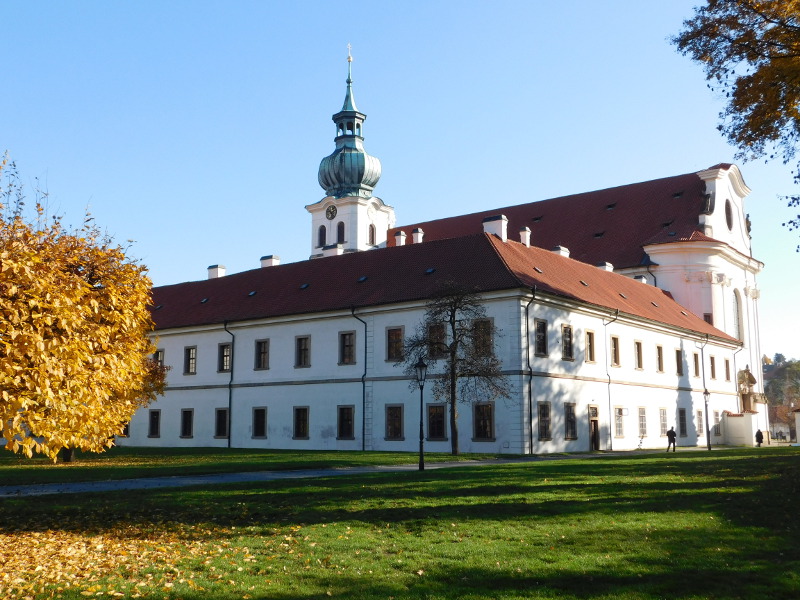
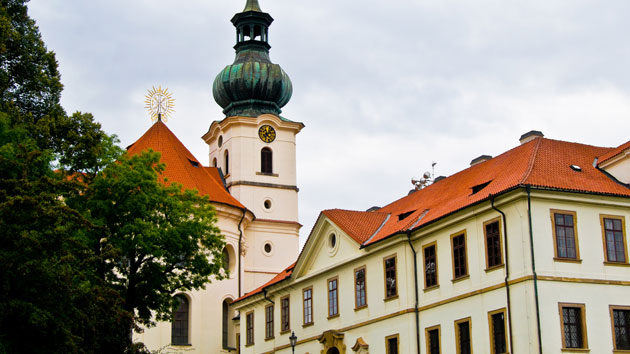
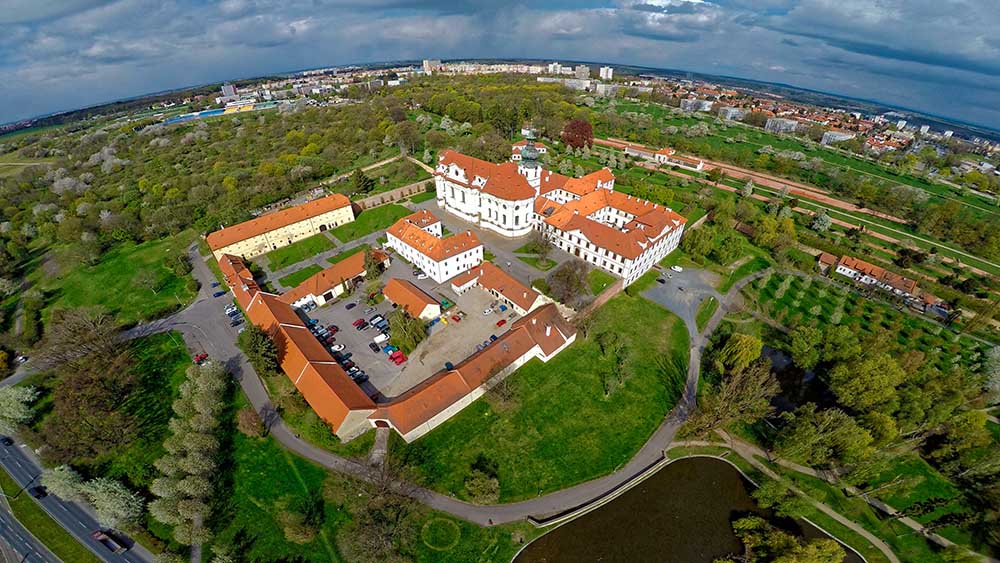
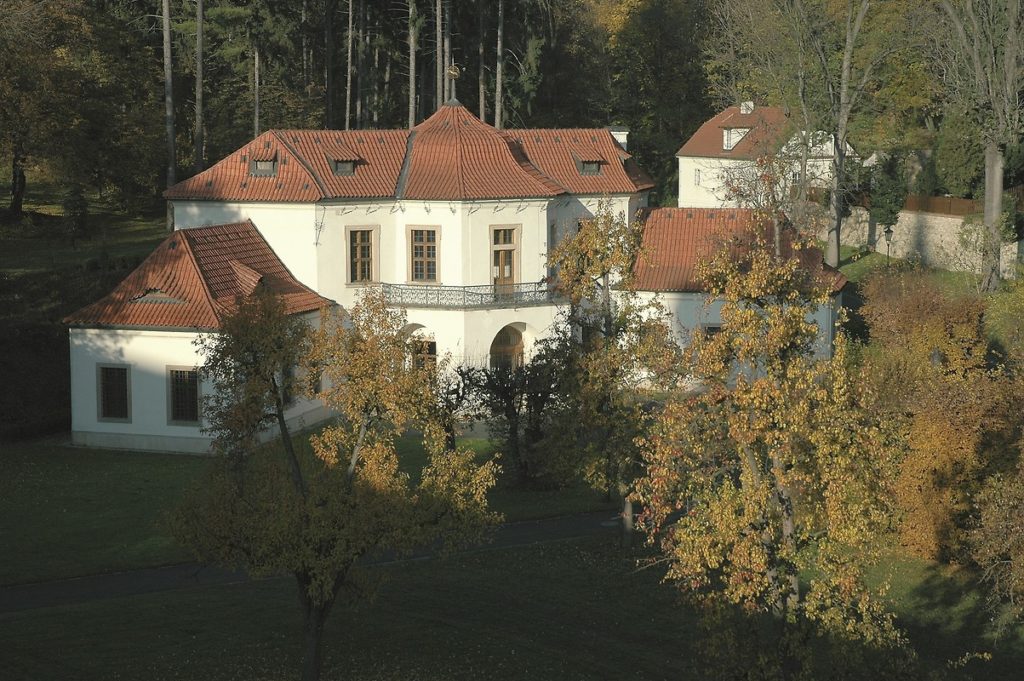
A few years ago, Sweden suddenly had the most innovative music scene in Europe with groups like The Knife, Little Dragon, and Jose Gonzalez to name just a few acclaimed on the international scene. Movits! joined this tier, but with even better sales internationally, by combining hip-hop and old-time jazz in a new direction—or at least it was new when they got started about a decade ago.
After all, jazz and hip-hop have been joined at the hips since the beginning of hip-hop and in the UK with the Acid Jazz scene since the mid-90s, but hip-hoppers had never fully reached out to Swing, the golden age of jazz (the 1930s through 1950s), when swing dancing was the rage in America and Europe.
And so, it took Movits!, a trio from Lulea, in northern Sweden to finally bridge these worlds. Movits! debut album in 2008 “Appelkynckarjazz” which translates in English as “Stealing apples jazz-style” combined the high-energy acoustic swing jazz of Django Reinhardt with the power of swing orchestras (thanks to modern electronics). Actually, it was only after hearing the Benny Goodman classic “Sing Sing Sing” at a party, that the brothers Anders & Johan got the idea to merge swing and hip-hop.
Movits! is at its core a trio with brothers Johan Jivin’ Rensfeldt (vocals), Anders Rensfeldt (keyboards and DJ-producer), and tenor saxophonist Joakim ‘One-Take’ Nilsson, and for the upcoming concert at Lucerna Music Bar they’ll have a new sound too–it’s no more “hip-hop swing” for these boys.
From hip-hop, their influences are still Old School from Mos Def, Outcast, the Roots, and Gang Starr, but their new sound is a harder electronic beats meets Bollywood and Swedish rap. Their older playful and even poetic deliveries (and all still in Swedish, by the way) seems to be a sound of their past.
T-shirts and jeans have also replaced their original attire, which was a mix of swing-era suits and rappers street gear–matching suits (black or white), bow-ties, and tuxedo tails, like Swing-era jazz dancers, but with matching ankle-high sneakers. Another earlier influence of theirs, the Rat Pack, popular lounge-singers of the ’50s and ’60s, led by Frank Sinatra and Sammy Davis Jr. is also gone.
Back to a decade ago, Movits! unique and tongue-in-cheek rap did not go unnoticed across Europe, but also in the U.S., where their album was released on the label Comedy Central Records.
Their appearance on the satirical news-show the Colbert Report in 2009, where they conversed with the host in near-perfect English, also catapulted their sales, and in 2011, MTV tracked their cross-country tour of the US and Canada to humorous effect. Meanwhile, they have since grown up in a serious way.
Tickets here
Prague Public Transit Company (DPP) will install air conditioning to all the trams Škoda 15T ForCity.
The air conditioning in the Škoda 15T ForCity will work in an almost automatic mode due to the manufacturer’s settings. The driver can only increase or decrease the passenger compartment temperature. Tram windows can be opened, but this will affect efficiency.
The total cost will exceed 400 million crowns.
In 2011, during the administration of then-mayor Tomáš Hudeček (TOP 09), the DPP started negotiations regarding the installation of air conditioning in the passenger compartment.
The tram, which is 31.4 m long and almost 2.5 m wide, has the capacity of 180 passengers – of which 61 are seated. Thanks to its ability to ride in arcs smoothly, the tram cuts travel time and speeds up traffic. This is also helped by six wide double-leaf doors which enable passengers to get on and off very quickly.
They are also 100% low-floor, offering problem-free transport for passengers with reduced mobility. This is in line with Prague’s strategic priority to ensure barrier-free access throughout the city’s public transport network by 2025.
At the moment, DPP is gradually launching the EMA system, which shall automatically, without the driver’s intervention, control selected functions of the vehicle, such as e.g. stops announcements, wheel and rail lubrication, reduction of speed to the prescribed value when riding in arcs or over crossings, display of the tram’s position at the underlying maps on an internal monitor for passengers, etc.
The very first tram line in Prague dates back to 1875 when a Belgian businessman built tracks for a horse-drawn tram. The line went from today’s Náměstí Republiky to the National Theatre. Horse-drawn trams were operating until 1925 when they were completely replaced by electric trams.
This year’s Christmas tree for Prague will come from the village of Semily (Liberec Region) in the north of the Czech Republic. The 24-meter spruce was selected by experts from some forty-two trees, suggested by the public.
The market organizing firm Taiko looks for trees that are in danger of being cut down in the near future. This way, the impact of cutting down the tree is minimal as it was already destined to come down. The tree is also disposed of in an ecological way after the holiday season is over, usually by being turned into mulch and reused.
“It is beautiful spruce that has grown in height in a private garden, so it has wonderful branches and is even,” said Petr Hozák of Taiko.
A poor quality tree fell in Old Town Square in 2003, leading to the serious injury of a British tourist. A different firm ran the holiday market at the time. The risk of a similar incident makes it important that experts agree on the health and stability of the tree.
The Prague Christmas markets are open every day from 30th November 2019 to 06th January 2020, including on Christmas Eve, Christmas Day and New Year’s Day.
The 2019/2020 Prague Christmas markets will take place in the following places:
- Old Town Square: from 30 November 2019 to 5 January 2020
- Wenceslas Square: dates to be confirmed
- Náměstí Míru: dates to be confirmed
- Tylovo Square: dates to be confirmed
- Náměstí Republiky: dates to be confirmed
The Christmas markets are generally open from 10 a.m. to 7 p.m. on Náměstí Míru, Tylovo Square and Náměstí Republiky, and from 10 a.m. to 10 p.m. on Wenceslas Square and Old Town Square.
For most of us, winter means holidays, family gatherings, and gift-giving.
But for people experiencing homelessness, winter is a brutal challenge. The cold weather makes life on the street even more dangerous than usual, and the societal focus on togetherness and holiday cheer can create a sense of even greater isolation.
If you would like to know how to help the homeless during winter, here’s an idea for making a great impact.
Nocleženka is a voucher in the value of CZK 100, which enables one homeless person to spend a night in the warmth of a Salvation Army hostel. However, it includes not only overnight accommodation but also other assistance.
The main, long-term goal of the entire project is to return people to ordinary life and to get them to a point where they no longer need Nocleženka and are fully self-sufficient.
The Salvation Army runs a winter dormitory from December to May, as homeless people are at risk of freezing to death.
“By buying a Kč 100 coupon, you will support a specific homeless person who will be able to spend the night in warmth in the dormitory of the Salvation Army in Prague, Brno, Ostrava or Karlovy Vary. However, it is not just about overnight stays, a homeless person is also provided with soup, bread, and a warm drink, and they have the opportunity to take a shower and attend to personal hygiene. Warm clothing and shoes are also available here,” the Salvation Army website says.
The basic price is CZK 100. However, if you decide to contribute a larger amount, we will be very grateful and we will use all of the money for the direct care of homeless people.
Homeless people normally pay a symbolic fee of Kč 30 to Kč 45 crowns for one night in a Salvation Army dormitory. But this does not cover the actual costs, which are between Kč 100 and Kč 200 per person.
People who contribute for a homeless person’s night’s lodging will receive an e-mail from the Salvation Army telling them which specific person benefited from the donation.
People who can’t contribute financially can help the homeless by donating warm clothes, blankets, sleeping bags, winter boots, caps, scarves and gloves to a Salvation Army branch or other charitable organization.
The Salvation Army was once active in Czechoslovakia before the Second World War but was banned when Nazi Germany occupied the country in 1939. Since it resumed its activities twenty-nine years ago, it has set up offices in nine Czech towns and cities.
To donate visit www.noclezenka.cz or www.darujme.cz
The coming cold weather means that outdoor skating rinks will start opening across Prague. Most places let you rent skates. The start dates, admission price and services at each rink differ.
One of the earliest ones to open in the center is at Na Františku in Prague 1, which should start November 18 (depending on the weather conditions). This one has an admission of Kč 70 for adults and Kč 40 for children.
Letná Plain in Prague 7 will have the largest rink, at 20 by 40 meters. The skating season will start there on November, 29th. This rink has an accompanying program for children who will have their own area and trained skating instructors. It is open till March 1, 2020, and admission is free. Ice skates rental is available.
Prague 8 will open two ice rinks as well: at the Glowacky Elementary School and at Ládví Swim Centre on November, 25th. A skate rental service will be available at both locations.
In Prague 6, the artificial ice rink at Dejvice district will be open daily from 9 a.m. to 9 p.m. The mobile ice area 18 x 25 meters is located at Victory square, near Šolínova street, where Farmer´s markets usually take place.
One of the most popular is in the city center at Ovocný trh, behind the Estates Theater. The opening ceremony takes place on St Nicholas (Sv Mikuláš) Eve, which is Dec. 5, at 5 pm with a special program. It will be open till the end of January, and admission is free.
In Prague 5, you can head to the Ice Stadium Nikolajka. An ice hockey stadium with a long tradition (established in 1961), it will serve for public ice skating during the weekends. The entrance fee is very low (only 40,- CZK) and same for 14 years. Open from November 16.
Germany’s ambassador Christoph Israng posted a photo of a Hitler-like rubber mask displayed in Prague at a souvenir shop, asking why such “trash” is out on the streets.
“The Czechs suffered so much under the Nazi regime. Why is such trash sold in the center of Prague now?” Ambassador Christoph Israng tweeted on Friday, without naming the shop.
??Češi za nacistického režimu tolik trpěli. Proč se teď v centru Prahy prodává takový odpad???Die Tschechen haben so unter den Nationalsozialisten gelitten. Warum wird solcher Schund mitten in Prag verkauft? pic.twitter.com/30cED6aLyI
— Christoph Israng (@velvyslanec_SRN) November 1, 2019
Czech Interior Minister Jan Hamacek soon weighed in, informing the ambassador that the police were looking into the matter.
Israeli ambassador Daniel Meron also weighed in on Twitter, condemning the masks as an “affront to Holocaust survivors.”
“80 years after beginning of WW2 and 75 years after the Liberation of Auschwitz, we should join forces to fight such spread of extremism and hatred,” Meron said, thanking Israng for “raising attention.”
The sale of such costumes is an affront to Holocaust survivors and their memory. 80 years after beginning of WW2 and 75 years after the Liberation of Auschwitz, we should join forces to fight such spread of extremism and hatred. Thank you for raising attention
— Daniel Meron (@AmbMeron) November 1, 2019
Propagating ideology aimed at suppressing human rights is punishable in the Czech Republic.
Up to 260,000 Czech Jews are estimated to have been killed in the Holocaust, after Nazi Germany annexed the Czech border region of Sudetenland in 1938, in the lead up to the World War II.

